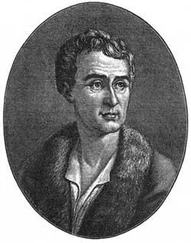Жан-Жак Руссо - The Confessions of Jean Jacques Rousseau — Volume 09
Здесь есть возможность читать онлайн «Жан-Жак Руссо - The Confessions of Jean Jacques Rousseau — Volume 09» — ознакомительный отрывок электронной книги совершенно бесплатно, а после прочтения отрывка купить полную версию. В некоторых случаях можно слушать аудио, скачать через торрент в формате fb2 и присутствует краткое содержание. Жанр: Биографии и Мемуары, literature_18, foreign_antique, на английском языке. Описание произведения, (предисловие) а так же отзывы посетителей доступны на портале библиотеки ЛибКат.
- Название:The Confessions of Jean Jacques Rousseau — Volume 09
- Автор:
- Жанр:
- Год:неизвестен
- ISBN:нет данных
- Рейтинг книги:5 / 5. Голосов: 1
-
Избранное:Добавить в избранное
- Отзывы:
-
Ваша оценка:
- 100
- 1
- 2
- 3
- 4
- 5
The Confessions of Jean Jacques Rousseau — Volume 09: краткое содержание, описание и аннотация
Предлагаем к чтению аннотацию, описание, краткое содержание или предисловие (зависит от того, что написал сам автор книги «The Confessions of Jean Jacques Rousseau — Volume 09»). Если вы не нашли необходимую информацию о книге — напишите в комментариях, мы постараемся отыскать её.
The Confessions of Jean Jacques Rousseau — Volume 09 — читать онлайн ознакомительный отрывок
Ниже представлен текст книги, разбитый по страницам. Система сохранения места последней прочитанной страницы, позволяет с удобством читать онлайн бесплатно книгу «The Confessions of Jean Jacques Rousseau — Volume 09», без необходимости каждый раз заново искать на чём Вы остановились. Поставьте закладку, и сможете в любой момент перейти на страницу, на которой закончили чтение.
Интервал:
Закладка:
I had likewise in my own mind projected a third, the idea of which I owed to the observations I had made upon myself and I felt the more disposed to undertake this work, as I had reason to hope I could make it a truly useful one, and perhaps, the most so of any that could be offered to the world, were the execution equal to the plan I had laid down. It has been remarked that most men are in the course of their lives frequently unlike themselves, and seem to be transformed into others very different from what they were. It was not to establish a thing so generally known that I wished to write a book; I had a newer and more important object. This was to search for the causes of these variations, and, by confining my observations to those which depend on ourselves, to demonstrate in what manner it might be possible to direct them, in order to render us better and more certain of our dispositions. For it is undoubtedly more painful to an honest man to resist desires already formed, and which it is his duty to subdue, than to prevent, change, or modify the same desires in their source, were he capable of tracing them to it. A man under temptation resists once because he has strength of mind, he yields another time because this is overcome; had it been the same as before he would again have triumphed.
By examining within myself, and searching in others what could be the cause of these different manners of being, I discovered that, in a great measure they depended on the anterior impressions of external objects; and that, continually modified by our senses and organs, we, without knowing it, bore in our ideas, sentiments, and even actions, the effect of these modifications. The striking and numerous observations I had collected were beyond all manner of dispute, and by their natural principle seemed proper to furnish an exterior regimen, which varied according to circumstances, might place and support the mind in the state most favorable to virtue. From how many mistakes would reason be preserved, how many vices would be stifled in their birth, were it possible to force animal economy to favor moral order, which it so frequently disturbs! Climate, seasons, sounds, colors, light, darkness, the elements, ailments, noise, silence, motion, rest, all act on the animal machine, and consequently on the mind: all offer a thousand means, almost certain of directing in their origin the sentiments by which we suffer ourselves to be governed. Such was the fundamental idea of which I had already made a sketch upon paper, and whence I hoped for an effect the more certain, in favor of persons well disposed, who, sincerely loving virtue, were afraid of their own weakness, as it appeared to me easy to make of it a book as agreeable to read as it was to compose. I have, however, applied myself but very little to this work, the title of which was to have been 'Morale Sensitive' ou le Materialisme du Sage. —[Sensitive Morality, or the Materialism of the Sage.]—Interruptions, the cause of which will soon appear, prevented me from continuing it, and the fate of the sketch, which is more connected with my own than it may appear to be, will hereafter be seen.
Besides this, I had for some time meditated a system of education, of which Madam de Chenonceaux, alarmed for her son by that of her husband, had desired me to consider. The authority of friendship placed this object, although less in itself to my taste, nearer to my heart than any other. On which account this subject, of all those of which I have just spoken, is the only one I carried to its utmost extent. The end I proposed to myself in treating of it should, I think, have procured the author a better fate. But I will not here anticipate this melancholy subject. I shall have too much reason to speak of it in the course of my work.
These different objects offered me subjects of meditation for my walks; for, as I believed I had already observed, I am unable to reflect when I am not walking: the moment I stop, I think no more, and as soon as I am again in motion my head resumes its workings. I had, however, provided myself with a work for the closet upon rainy days. This was my dictionary of music, which my scattered, mutilated, and unshapen materials made it necessary to rewrite almost entirely. I had with me some books necessary to this purpose; I had spent two months in making extracts from others, I had borrowed from the king's library, whence I was permitted to take several to the Hermitage. I was thus provided with materials for composing in my apartment when the weather did not permit me to go out, and my copying fatigued me. This arrangement was so convenient that it made it turn to advantage as well at the Hermitage as at Montmorency, and afterwards even at Motiers, where I completed the work whilst I was engaged in others, and constantly found a change of occupation to be a real relaxation.
During a considerable time I exactly followed the distribution I had prescribed myself, and found it very agreeable; but as soon as the fine weather brought Madam d'Epinay more frequently to Epinay, or to the Chervette, I found that attentions, in the first instance natural to me, but which I had not considered in my scheme, considerably deranged my projects. I have already observed that Madam d'Epinay had many amiable qualities; she sincerely loved her friends; served them with zeal; and, not sparing for them either time or pains, certainly deserved on their part every attention in return. I had hitherto discharged this duty without considering it as one, but at length I found that I had given myself a chain of which nothing but friendship prevented me from feeling the weight, and this was still aggravated by my dislike to numerous societies. Madam d' Epinay took advantage of these circumstances to make me a proposition seemingly agreeable to me, but which was more so to herself; this was to let me know when she was alone, or had but little company. I consented, without perceiving to what a degree I engaged myself. The consequence was that I no longer visited her at my own hour —but at hers, and that I never was certain of being master of myself for a day together. This constraint considerably diminished the pleasure I had in going to see her. I found the liberty she had so frequently promised was given me upon no other condition than that of my never enjoying it; and once or twice when I wished to do this there were so many messages, notes, and alarms relative to my health, that I perceived that I could have no excuse but being confined to my bed, for not immediately running to her upon the first intimation. It was necessary I should submit to this yoke, and I did it, even more voluntarily than could be expected from so great an enemy to dependence: the sincere attachment I had to Madam D'Epinay preventing me, in a great measure, from feeling the inconvenience with which it was accompanied. She, on her part, filled up, well or ill, the void which the absence of her usual circle left in her amusements. This for her was but a very slender supplement, although preferable to absolute solitude, which she could not support. She had the means of doing it much more at her ease after she began with literature, and at all events to write novels, letters, comedies, tales, and other trash of the same kind. But she was not so much amused in writing these as in reading them; and she never scribbled over two or three pages—at one sitting—without being previously assured of having, at least, two or three benevolent auditors at the end of so much labor. I seldom had the honor of being one of the chosen few except by means of another. When alone, I was, for the most part, considered as a cipher in everything; and this not only in the company of Madam D'Epinay, but in that of M. d'Holbach, and in every place where Grimm gave the 'ton'. This nullity was very convenient to me, except in a tete-a-tete, when I knew not what countenance to put on, not daring to speak of literature, of which it was not for me to say a word; nor of gallantry, being too timid, and fearing, more than death, the ridiculousness of an old gallant; besides that, I never had such an idea when in the company of Madam D'Epinay, and that it perhaps would never have occurred to me, had I passed my whole life with her; not that her person was in the least disagreeable to me; on the contrary, I loved her perhaps too much as a friend to do it as a lover. I felt a pleasure in seeing and speaking to her. Her conversation, although agreeable enough in a mixed company, was uninteresting in private; mine, not more elegant or entertaining than her own, was no great amusement to her. Ashamed of being long silent, I endeavored to enliven our tete-a-tete and, although this frequently fatigued me, I was never disgusted with it. I was happy to show her little attentions, and gave her little fraternal kisses, which seemed not to be more sensual to herself; these were all. She was very thin, very pale, and had a bosom which resembled the back of her hand. This defect alone would have been sufficient to moderate my most ardent desires; my heart never could distinguish a woman in a person who had it; and besides other causes useless to mention, always made me forget the sex of this lady.
Читать дальшеИнтервал:
Закладка:
Похожие книги на «The Confessions of Jean Jacques Rousseau — Volume 09»
Представляем Вашему вниманию похожие книги на «The Confessions of Jean Jacques Rousseau — Volume 09» списком для выбора. Мы отобрали схожую по названию и смыслу литературу в надежде предоставить читателям больше вариантов отыскать новые, интересные, ещё непрочитанные произведения.
Обсуждение, отзывы о книге «The Confessions of Jean Jacques Rousseau — Volume 09» и просто собственные мнения читателей. Оставьте ваши комментарии, напишите, что Вы думаете о произведении, его смысле или главных героях. Укажите что конкретно понравилось, а что нет, и почему Вы так считаете.











